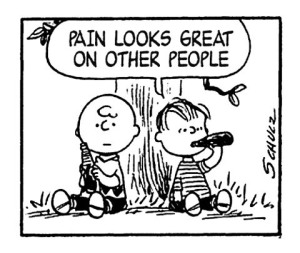Scene 1: Your manager shouted at a fellow collegue and marked poor ratings for no apparent fault. This made you feel very great and you secretly enjoyed this moment leaving all your important work midway.
Scene 2: You rub hands in glee when your best friend miserably failed in a job interview and not able to land his dream job.
Scene 3: You can’t stop yourself chuckling when someone spills a cup of hot tea down on your manager’s white formal shirt when he was going to attend an important meeting with stakeholders.
Just give a thought what’s the common thread between all the above-mentioned three scenes. Well, in all the scenes, protagonists couldn’t stop feeling incredible joy from observing someone else’s suffer specific to bad things or failure. Every time anything bad incident happened to anyone, the skeptical thoughts colonized his brain to varying degree and he can’t stop enjoying other people’s misfortune instead being sympathetic. Well, there’s a word for this malicious enjoyment i.e. Schadenfreude means feeling pleasure in others’ misfortune.

Mina Cikara, Harvard University psychologist Mina Cikara said that a lack of empathy is not always pathological. It’s a human response, and not everyone experiences this, but a significant portion does. Described as the exact opposite of empathy, Schadenfreude is the worst possible human emotion which primarily activates in 3 circumstances – (a) when an observer is strongly associated with an personal involvement of competition and gain something from someone else’s failure, (b) when an observer like a sadistic heartbreaker combines this wicked emotion with sadism, hate and cruelty because another’s misfortune is highly deserved, (c) when bad things befalls to a person whom you’re envious and you feel uplifted about that person’s loss.
What impact it led to? Badly strained relationships, massive loss of so many productive time and low self-esteem. In today’s competitive organizational culture, there no escaping from office politics, back-biting, and annoying envious subordinates. Observing the misfortune of their competitors brings a subsequent sense of satisfaction to this population. They are born with a tendency to dominate productive resources of the company in sheer frustration of not being able to achieve success for themselves.

Many kinds of research and studies revealed that schadenfreude stems from a deeper level primarily in terms of self-esteem, self-control, belongingness, and meaningful existence. Such individuals are by-and-large poor or underperformers’ yet highly competitive and it is this paradox that ignites an objectionable form of pleasure called schadenfreude. It is well explained by psychologist Professor Richard H. Smith in his popular book ‘The Joy of Pain’ that, comparisons with others and the conclusions we make about ourselves based on them, and the resulting emotions pervade most of our lives.
As much as inferiority makes us feel bad, superiority makes us feel good. The simple truth is that misfortunes happening to others are one path to the joys of superiority and help explain many instances of schadenfreude.
“Social comparisons are a way of life”
Generally, there are 3 major reasons why people feel pleased with the misfortune of another person:
(a) The other person is perceived to deserve the misfortune — This is purely an act of victim-blaming that occurs when a person is experiencing emotional outbursts and not able to accept his failures. As a defense mechanism, the protagonist feels pleasure-in-others’-misfortune with a strong belief the other person is destined to sufferings and his malicious joy is justified.
(b) They are passive in generating the other’s misfortune — It has a lot to do with the theory of karma. According to a person who is experiencing schadenfreude, his rival sufferings are well deserved and the distress seems like moral causation to him.
(c) The personal comparative behavior syndrome — This happens with people constantly battling for attention. When the focus of attention shifts to someone else these people start feeling an overwhelming sense of jealousy.
Organizations and employers of today must understand that employees are extremely sensitive stakeholders who are a collective reservoir of emotions and feelings. Therefore, investments should be made to address the issues and concerns of every employee at a primitive level, to create a positive working environment within the organization.
“Nothing is more important than empathy for another human being’s suffering. Not a career. Not wealth. Not intelligence. Certainly not status. We have to feel for one another if we’re going to survive with dignity” — Audrey Hepburn
This article is written in partnership with TBM Growth, India’s premier growth strategy services company institutionalises growth strategy for entrepreneurs & Leaders who aim to build innovative organisations. Deploying its expert intervention into key areas such as Strategy Business & Execution.
Tags: Schadenfreude, human behaviour, psychology, mental health, fear of failure, self esteem
